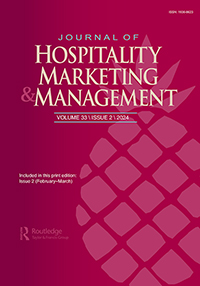智能技术、人工智能、自动化、机器人和算法(STAARA)意识如何影响酒店员工的职业观念?颠覆性创新理论视角
IF 11.9
1区 管理学
Q1 BUSINESS
Journal of Hospitality Marketing & Management
Pub Date : 2023-01-10
DOI:10.1080/19368623.2023.2166186
引用次数: 4
摘要
随着智能技术、人工智能、自动化、机器人和算法(STAARA)在酒店服务领域的广泛应用,人们越来越需要了解它们对酒店员工职业观念的潜在影响。本研究基于颠覆性创新理论和刺激-有机体-反应(SOR)模型进行了两个基于场景的实验,研究STAARA意识如何影响酒店员工的工作不安全感和流动性。此外,本研究还考察了职业发展作为削弱STAARA替代效应的对策。研究1表明,酒店员工对STAARA的消极(与积极)认知导致更高的工作不安全感和流动性。此外,根据研究2,对于职业发展水平较低的酒店员工,消极(与积极)的STAARA意识会导致更高的工作不安全感和流动性。然而,在高水平职业发展的员工中,没有显著差异,这意味着高水平职业发展减弱了STAARA的影响。本研究也考虑了理论和实践的影响。本文章由计算机程序翻译,如有差异,请以英文原文为准。
How does smart technology, artificial intelligence, automation, robotics, and algorithms (STAARA) awareness affect hotel employees’ career perceptions? A disruptive innovation theory perspective
ABSTRACT The extensive implementation of smart technology, artificial intelligence, automation, robotics, and algorithms (STAARA) in hospitality services has accelerated the need to understand their potential influence on hotel employees’ career perceptions. This study conducted two scenario-based experiments based on disruptive innovation theory and the Stimulus-Organism-Response (SOR) model to examine how STAARA awareness shapes hotel employees’ job insecurity and mobility. In addition, this study investigated career progression as a counterstrategy to attenuate the substitution effect of STAARA. Study 1 demonstrated that hotel employees’ negative (vs. positive) awareness of STAARA leads to higher job insecurity and mobility. Furthermore, according to Study 2, for hotel employees with low-level career progression, negative (vs. positive) awareness of STAARA induces higher job insecurity and mobility. However, among employees with high-level career progression, there were no significant differences, which means that high-level career progression attenuates the impact of STAARA. This study also considers theoretical and practical influences.
求助全文
通过发布文献求助,成功后即可免费获取论文全文。
去求助
来源期刊
CiteScore
20.90
自引率
6.40%
发文量
33
期刊介绍:
The Journal of Hospitality Marketing & Management serves as a peer-reviewed platform dedicated to advancing understanding, practice, and education in hospitality marketing and management. It strives to foster the development of knowledge and theory by promoting new ideas, models, approaches, and paradigms. Embracing a multifaceted approach that spans administrative disciplines, liberal arts, and social sciences, the journal disseminates knowledge through high-quality, peer-reviewed research papers, reports, and book reviews. It stands as a unique forum for the community of students, academics, and practitioners who share a common interest and commitment to the field of hospitality marketing and management.

 求助内容:
求助内容: 应助结果提醒方式:
应助结果提醒方式:


